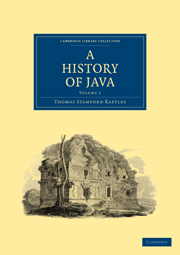Book contents
- Frontmatter
- Preface
- Preface
- Contents
- LIST OF PLATES IN VOLUME I
- Java first visited by the Portuguese
- CHAPTER I
- CHAPTER II
- CHAPTER III
- CHAPTER IV
- CHAPTER V
- CHAPTER VI
- CHAPTER VII
- CHAPTER VIII
- AN ANALYSIS OF THE BRÁTA YÚDHA, OR HOLY WAR, OR RATHER THE WAR OF WOE: AN EPIC POEM, IN THE KÁWI OR CLASSIC LANGUAGE OF JAVA
- Plate section
AN ANALYSIS OF THE BRÁTA YÚDHA, OR HOLY WAR, OR RATHER THE WAR OF WOE: AN EPIC POEM, IN THE KÁWI OR CLASSIC LANGUAGE OF JAVA
Published online by Cambridge University Press: 05 March 2012
- Frontmatter
- Preface
- Preface
- Contents
- LIST OF PLATES IN VOLUME I
- Java first visited by the Portuguese
- CHAPTER I
- CHAPTER II
- CHAPTER III
- CHAPTER IV
- CHAPTER V
- CHAPTER VI
- CHAPTER VII
- CHAPTER VIII
- AN ANALYSIS OF THE BRÁTA YÚDHA, OR HOLY WAR, OR RATHER THE WAR OF WOE: AN EPIC POEM, IN THE KÁWI OR CLASSIC LANGUAGE OF JAVA
- Plate section
Summary
INTRODUCTORY REMARKS
The wife of Santánu, king of Astína, dying on giving birth to Détect Bráta (Bísma). Santánu asked Pulásara, the Prábu-Anom (or younger prince), of Wiráta, and brother-in-law of Mángsah Páti, prince of that country, to allow his wife Ambarsári, who at that time had a child (Abiása) at the breast, to suckle and so save the life of his infant boy Déwa Bráta.
Pulasára, offended at the proposal, went to war with Santánu, but was afterwards persuaded by the Déwa Sang yang Naráda to comply, on condition of Santánu resigning his kingdom to him; to which Santánu agreed. Pulasára, when his son Abiása was grown up, gave him the kingdom of Astína, and turning hermit went and passed the rest of his days on the mountains.
By his wife Ambalíka (the old maiden daughter of Baliétma, a hermit of Gúnung Chámaragándi, whom he was forced to marry against his inclination) Abiása had three sons, viz.
Drestaráta, who was blind.
Pándu, whose head was inclined to one side.
Aria Widúra, who was lame.
Pándu, the least exceptionable of the three sons, being raised to the throne, Abiása turned hermit, and went and passed the remainder of his days among the mountains.
On the death of Panda, Drestaráta persuaded his father Abiása to allow him to rule the country during the minority of the Pandáwa (or five children dren of Pándu).
- Type
- Chapter
- Information
- A History of Java , pp. 415 - 479Publisher: Cambridge University PressPrint publication year: 2010First published in: 1817



